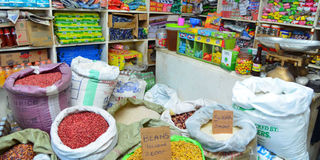More solutions required to stem rising prices

Some of the prices of some consumer goods in a retail shop in Namuwongo, Kampala, on March 4, 2022. A change in the price of oil and gas products such as petrol has a trickle-down effect on the prices of all other goods. PHOTO | FRANK BAGUMA
What you need to know:
- The issue: Rising prices
- Our view: If ever there was a time to devise means of regulation for key sectors and to step up government intervention on rising commodity prices, that time is now. A comprehensive review of policy and application of creative solutions should help to alleviate some of the current price pains.
Since the close of last year, commodity prices have been on a steady rise, especially the pump prices of fuel. There was a huge public outcry then, when the prices began to climb fast and steadily.
At the time, the rising prices were attributed to the buildup of traffic at the border due to stalled trucks in a holdup over Covid restrictions. Government issued several directives to this effect and even though the truck jam was eventually cleared, fuel pump prices have never recovered and remain prohibitive and the highest in comparison, within the East African region.
In subsequent weeks, the prices of other essential commodities have followed the upward trend set by fuel prices. Soap, cooking oil and to a lesser extent, sugar and building materials have also been on the rise.
After much public outcry, the Ministry of Finance is finally responding to some of the public concerns on commodity prices.
Some of the price hikes, especially of locally manufactured goods have been attributed to the rising cost of production, also partly linked to the high cost of transportation but there are also questions of high tax burden on import of certain raw materials among other given causes.
Amid all this, the ordinary citizens bear the brunt of the high commodity prices, making the cost of living unbearably high and almost putting certain essential goods out of the reach of many. With the stated average income per person at just above two dollars a day, meeting the rising basic costs is tough to begin with, not to mention the other costs they must contend with, including housing, education and healthcare.
It is high time the government considered all possible avenues of subsidising the cost of essential goods for the local citizen in order to give them more room to spend on other items besides the basics. The government should step in to prevent a situation where more Ugandans will sink into the category of those living from hand to mouth. And if some subsidies and waivers are directed at the industries producing some of these highly priced goods, it would not only boost local production but also possibly lead to a lowering of prices which would boost local consumption.
If ever there was a time to devise means of regulation for key sectors and to step up government intervention on rising commodity prices, that time is now. A comprehensive review of policy and application of creative solutions should help to alleviate some of the current price pains..




